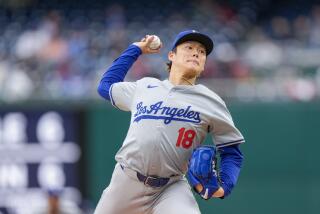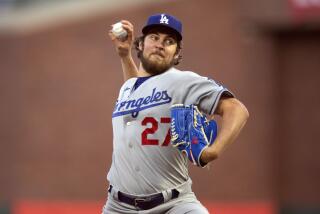Dodgers could learn from Phillies’ open wallet
The ace comes to market. The hometown fans drool. The ace goes elsewhere, and the fans are left with explanations.
You can probably recite them by heart: We’re not going to mortgage the future. The guy makes too much money. We don’t want to rent a player.
We present to you the Philadelphia Phillies. In one year and one day, the Phillies traded for Cliff Lee, Roy Halladay and Roy Oswalt. It is no coincidence the Phillies are two victories from a third consecutive World Series appearance.
The Phillies could have offered a perfectly reasonable explanation for passing on Oswalt this summer. They had Halladay. They had Cole Hamels. They had the bats.
They’re not into explanations. They’re in it to win it. They got Oswalt, and the San Francisco Giants will see him in Saturday’s Game 6 of the National League Championship Series.
“Once you get down to the eight best clubs in baseball, or the four best clubs in baseball, it really comes down to pitching,” Philadelphia General Manager Ruben Amaro Jr. said.
“It’s pitching that wins games. You have to be lucky, and you have to have timely hitting, but it’s really about pitching.”
The Giants boast terrific pitching too, a rotation built the old-fashioned way. Tim Lincecum came in the draft, and so did Matt Cain, Jonathan Sanchez and Madison Bumgarner.
The way Amaro did it? San Francisco General Manager Brian Sabean tips his cap.
“It’s pretty amazing,” Sabean said. “They’re in a different place and time, going for their third straight National League pennant. Their mind-set is geared that way. They’re committed to action because of that.
“A lot of teams say, ‘Our goal is to get to the World Series and win it.’ They can realistically set that goal.”
“They deserve this place and time. They’ve earned it.”
To translate their commitment into action, the Phillies needed money and prospects, and the willingness to spend both.
The Phillies sold out every game this season, all but eight games last season.
“Our fans get a lot of credit for getting us to this point,” Amaro said.
That helps on the money end. On the prospect end, the Phillies cleaned out their farm system.
Of the Phillies’ 10 best prospects, as rated by Baseball America before the 2009 season, Amaro traded four to get Lee, three to get Halladay, one to get Oswalt.
“It’s virtually impossible to do that every year,” Amaro said.
The better the Phillies do, the lower their draft position, the less likely the Phillies sign the kind of impact prospect so valuable in trade talks.
“There are times when you’re lucky you’re in a cycle of your system. You can do that,” Amaro said. “At some point, it has to stop. We have to rely on younger guys to take over.”
The Phillies’ system already had produced a brilliant offensive core, led by Ryan Howard, Jimmy Rollins and Chase Utley.
The need was pitching. The time was now.
“It depends upon what you mean by now,” Amaro said. “We’re trying to extend this.
“No one will ever do what Atlanta did, win 14 straight. If you have a core of championship-caliber players, you want to try to extend that window as much as you can.”
This should be an autumn of regret for the Dodgers. Their window is closing too. Manny Ramirez is gone. Casey Blake is 36. Rafael Furcal is 33, with an injury history. Russell Martin has regressed. James Loney never did develop power.
The Dodgers tried for Lee, for Halladay, for Oswalt.
The Phillies were judged by four trade partners — the Cleveland Indians and Seattle Mariners for Lee, the Toronto Blue Jays for Halladay and the Houston Astros for Oswalt — to have had better prospects, closer to the major leagues.
The Dodgers generate more revenue than the Phillies do, according to Forbes estimates and the McCourt divorce trial that revealed the Dodgers diverted huge chunks of that money to their owners, and to their bankers.
Whatever the explanations — and they do not much matter now — the Phillies traded for three aces, the Dodgers none. The Phillies could advance to their third consecutive World Series; the Dodgers cling to the grainy video of Kirk Gibson.
The Phillies could lose Saturday, or Sunday, and the World Series could go on without them. Whatever the outcome, they gave themselves the best shot to succeed.
The price of success could be a recurring headache, every time the trade deadline rolls around.
“The biggest problem we’ve created is the expectation that every July 31 we’ll come up with a No. 1 starter,” Amaro said.
As problems go, that’s not a bad one to have.
More to Read
Are you a true-blue fan?
Get our Dodgers Dugout newsletter for insights, news and much more.
You may occasionally receive promotional content from the Los Angeles Times.







